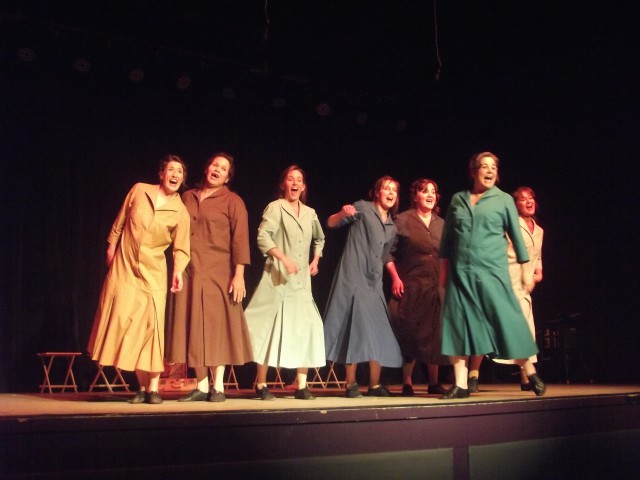
Emma Goldman’s name was once synonymous with anarchy, free love and violence. In the first decades of the 20th century, she gave speeches to crowds of up to 25,000 with titles like “Monogamy or variety, which?” One of her talks supposedly inspired the assassination of President William McKinley.
What better subject for a musical?
That’s the thinking of Paonia resident Marty Durlin and her work, Beautiful Radiant Things, which comes to Boulder April 28 and Denver April 29. It is a musical take on the anarchist’s life, set during a two-year stint in a Missouri prison Goldman served after opposing World War I conscription. Durlin admits that most people view musical theater as light and unserious, which makes the choice to write a musical about Goldman seem somewhat strange.
“It’s true,” she says, but adds, “People have written musicals about just about everything at this point. It’s not quite as odd as it sounds, but it was kind of weird. … We think of musicals as being South Pacific or My Fair Lady or something kind of classic, but really, anything works. This is the most fun I’ve had doing anything like this.”
This is hardly the first go for Durlin, the former manager of KGNU. She has been writing musicals and plays since the late ’70s, and she wrote the book, the music and the lyrics for this one. It’s a community theater production sporting an all-woman cast, with KVNF (a community radio station in western Colorado) manager Sally Kane playing the role of Goldman.
Goldman is a polarizing figure in American history. She left Russia for the United States as a teenager, and she became involved in the anarchist movement after moving from Rochester, N.Y., to New York City. To some, she was a hero, to others, a dangerous villain. She was an anarchist, sure, but she was somewhat of an anarchist within the movement itself. There is a story about Goldman that became popular in the ’70s, decades after her death in 1940. Goldman wrote in one of her memoirs about being admonished for enjoying herself at a party, being told that “it did not behoove an agitator to dance.”
“I did not believe that a Cause which stood for a beautiful ideal, for anarchism, for release and freedom from conventions and prejudice, should demand the denial of life and joy,” Goldman wrote. “I insisted that our Cause could not expect me to become a nun and that the movement should not be turned into a cloister. If it meant that, I did not want it.”
That sentiment later was para phrased into something like, “If I can’t dance I don’t want to be part of your revolution.” This sentiment was Durlin’s first exposure to Goldman, and after researching her more thoroughly, she admires the courage and boldness that allowed her to make that statement.
“She was just incredibly brave all of her life, and she really would tread where others fear to go,” Durlin says. “And she would say things that were not being uttered at all publicly.
“Society really hasn’t caught up to it. She was talking about workers’ rights and free love and contraception, and that’s really coming around again. Pretty amazing. Somebody during her time said that she was about 8,000 years ahead of the time.”
Durlin says she focused on Goldman’s time in prison on somewhat of a whim. She had an earlier prisonfocused idea that she scrapped, but as she read about her term in Missouri, inspiration struck.
“As I researched it more, it was a rich trove, historically,” Durlin says. “Once I got to the Missouri State Penitentiary site and got into the historical records there and got the names of the other prisoners, it just excited my imagination, like Lulu Ibbs and Lottie Funk. They just sort of appeared before me as people, it just was inspiring, and away I went.”
Respond: [email protected]
ON THE BILL: Beautiful Radiant Things plays Saturday, April 28, at Unity Church of Boulder at 7:30 p.m., and at the Cleo Parker Robinson Dance Theatre in Denver on Sunday, April 29, at 4 p.m. Tickets are $12 in advance, $15 day of show. For tickets, visit kgnu.org or call 303-449-4885.














